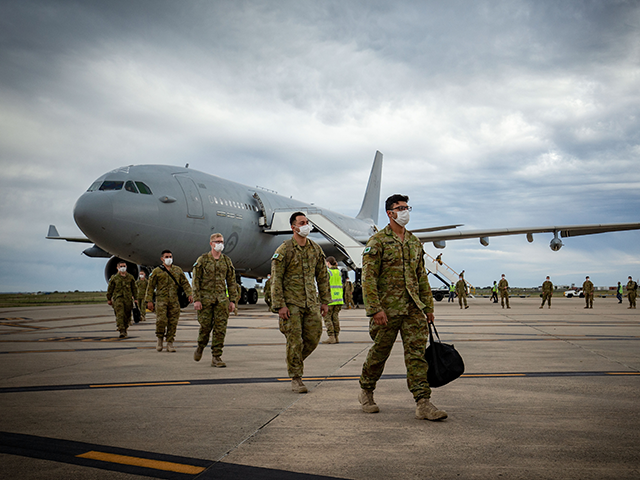Australia reported 5,450 hospitalizations due to the Wuhan coronavirus on Monday, a record high that doctors say is driven by the highly contagious BA.4 and BA.5 sub-variants of the omicron strain.
“The number of those in hospitals is the highest since the emergence of the coronavirus, exceeding January’s high of 5,390 during the first wave of Omicron infections. Daily death tolls have also risen, topping 100 on Saturday for the first time,” Reuters noted.
Over a thousand outbreaks have been reported in retirement homes, which said they lacked the staff to deal with so many health crises, so military personnel were dispatched to reinforce them — an “extreme measure” defended as vitally necessary by Australian Defense Minister Richard Marles.
Australia has very high vaccination rates — almost 95 percent of adults have received two-shot full vaccination and 71 percent have taken booster shots — but the BA.4 and BA.5 strains so far appear to be vaccine-resistant, in addition to being highly contagious. It is currently winter in Australia, a season when the coronavirus tends to spread more rapidly.
Australia’s ABC News noted on Sunday that the nation now has the third-highest coronavirus death rate per capita in the world, “and the numbers are getting worse.” Health care workers are reportedly suffering under the strain of their third Chinese coronavirus winter and many of them are contracting the contagious omicron variant from their patients.
The general public is also suffering from “Covid fatigue,” as the UK Guardian put it on Saturday, which may have slowed the response against the third major omicron wave. Psychologist Chris Cheers said one manifestation of this multifaceted fatigue is people who are longing for more mandates and lockdowns because they are tired of making their own judgments about the risks and rewards of leaving their homes and interacting with other people.
“They’re saying, ‘I need to stop. I need to rest. I need to have a break from this, but there’s these expectations that I just can’t act against,’” said Cheers.
“We have to find a way to push back. To say, ‘no – things aren’t back to normal.’ At the time of a global pandemic, maybe this is the time to challenge some of those expectations about the way we should be living,” Cheers advised.
Other Australians are weary of mandatory health measures, especially since they were led to believe that vaccination was their “ticket out of the pandemic,” as Australian Chief Medical Officer Paul Kelly put it in another Guardian piece on Friday.
“Last year, I definitely did not think we would be in this position. I definitely thought that with very high vaccination rates and what we knew about Covid vaccination and protection against disease from other variants, it would put us in very good stead,” agreed infectious disease expert Sharon Lewin.
Prof. Jason Kovacic of the Victor Chang Cardiac Research Institute told the Sydney Morning Herald (SMH) on Sunday that Australia faces “sobering, staggering numbers” of “long Covid” cases.
“We’re looking at almost half a million people who are going to be suffering long-term symptoms in the coming months,” Kovacic warned.
“At St Vincent’s Hospital’s long Covid clinic — which has a waitlist exceeding four months — the majority of patients are young, previously fit people, with women outnumbering men,” the SMH observed.
Australian researchers have found women are 22 percent more likely than men to be diagnosed with lingering “long Covid” effects, which poses a significant problem for the Australian healthcare system, where female workers outnumber men almost three to one.

COMMENTS
Please let us know if you're having issues with commenting.